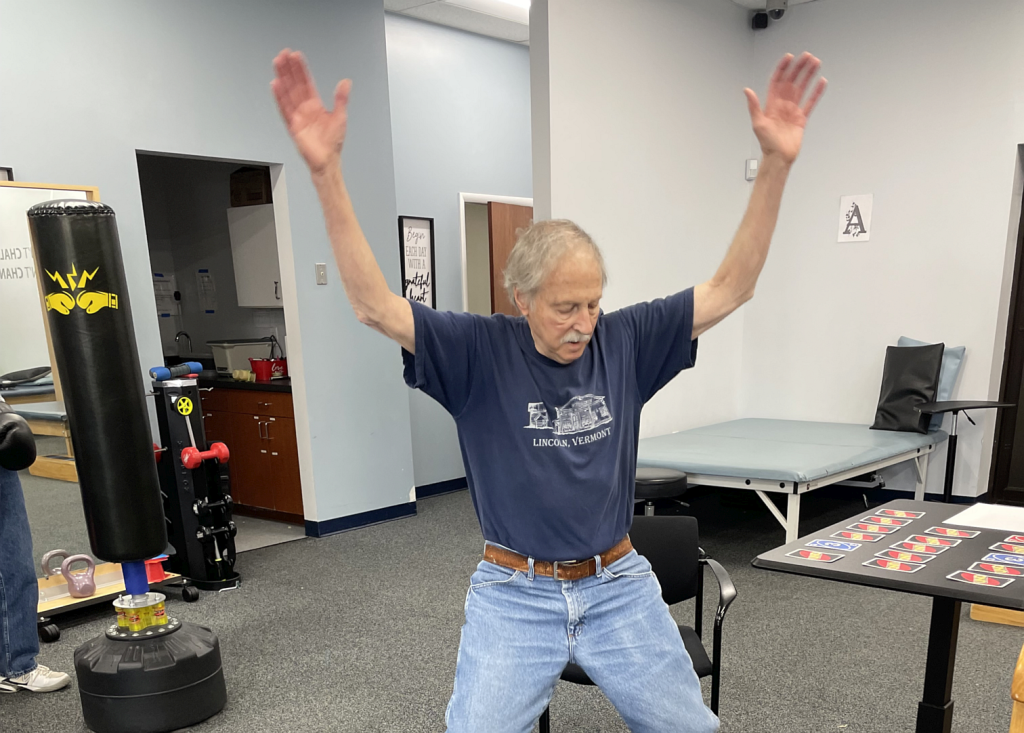
ABOUT PARKINSON’S DISEASE
Parkinson’s disease is a progressive neurological disorder that affects movement, characterized by symptoms such as tremors, stiffness, slow movement, and impaired balance. It results from the loss of dopamine-producing brain cells, leading to difficulties with tasks like walking and talking. Treatment focuses on managing symptoms through medications, therapy, and sometimes surgery, with ongoing research aimed at improving treatments and finding a cure.
PARKINSON’S STATISTICS
Approximately 90,000 are diagnosed with Parkinson’s disease yearly and every 6 minutes someone is diagnosed with PD
Parkinson’s is the fastest growing neurological disease.
Studies have proven that physical exercise is a way to slow the progression of Parkinson’s symptoms.
PARKINSON’S SUPPORT
Symptoms of Parkinson’s disease can vary from person to person. Initial symptoms may be subtle and easily overlooked. Typically, symptoms manifest on one side of the body initially, with that side often maintaining greater severity even as the condition progresses to affect both sides of the body.
SYMPTOMS MAY INCLUDE:
- Tremors:
- Rhythmic shaking, called tremor, usually begins in a limb, often your hand or fingers. You may rub your thumb and forefinger back and forth. This is known as a pill-rolling tremor. Your hand may tremble when it’s at rest. The shaking may decrease when you are performing tasks.
- Rhythmic shaking, called tremor, usually begins in a limb, often your hand or fingers. You may rub your thumb and forefinger back and forth. This is known as a pill-rolling tremor. Your hand may tremble when it’s at rest. The shaking may decrease when you are performing tasks.
- Slowed Movement, Known as Bradykinesia:
- Over time, Parkinson’s disease may slow your movement, making simple tasks difficult and time-consuming. Your steps may become shorter when you walk. It may be difficult to get out of a chair. You may drag or shuffle your feet as you try to walk.
- Over time, Parkinson’s disease may slow your movement, making simple tasks difficult and time-consuming. Your steps may become shorter when you walk. It may be difficult to get out of a chair. You may drag or shuffle your feet as you try to walk.
- Facial Mask:
- Having a Parkinson’s mask is a common symptom. If someone can’t use their facial muscles to express themselves as easily anymore, it doesn’t mean they are low or depressed. Some people with Parkinson’s have apathy and problems with motivation. This means they may not respond to emotions like they used to.
- Having a Parkinson’s mask is a common symptom. If someone can’t use their facial muscles to express themselves as easily anymore, it doesn’t mean they are low or depressed. Some people with Parkinson’s have apathy and problems with motivation. This means they may not respond to emotions like they used to.
- Rigid Muscles:
- Muscle stiffness may occur in any part of your body. The stiff muscles can be painful and limit your range of motion.
- Muscle stiffness may occur in any part of your body. The stiff muscles can be painful and limit your range of motion.
- Impaired Posture and Balance:
- Your posture may become stooped. Or you may fall or have balance problems as a result of Parkinson’s disease.
- Your posture may become stooped. Or you may fall or have balance problems as a result of Parkinson’s disease.
- Loss of Automatic Movements:
- You may have a decreased ability to perform unconscious movements, including blinking, smiling or swinging your arms when you walk.
- You may have a decreased ability to perform unconscious movements, including blinking, smiling or swinging your arms when you walk.
- Speech Changes:
- You may speak softly or quickly, slur, or hesitate before talking. Your speech may be more of a monotone rather than have the usual speech patterns.
- You may speak softly or quickly, slur, or hesitate before talking. Your speech may be more of a monotone rather than have the usual speech patterns.
- Writing Changes:
- It may become hard to write, and your writing may appear small.
- It may become hard to write, and your writing may appear small.

